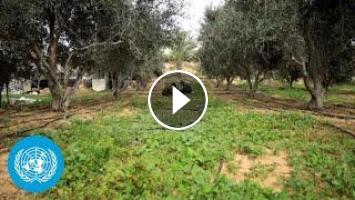In Gaza, unemployed youth have resorted to selling wild plants on the markets of Dier Al Balah in the central part of the Strip in an effort to make any kind of living.
Nearly five months into the devastating war in Gaza, unemployed youths have resorted to selling wild plants on the markets of Dier Al Balah in the central part of the Strip in an effort to make any kind of living.
Their journey begins in the open fields every morning as they search for and gather wild plants that have been eaten as side dishes in the Middle East for generations; and have now become a major food source for residents of the Gaza Strip.
The living conditions in the besieged enclave have reached an abysmal state and are systematically deteriorating as the latest round of violence that began on 7 October continues to wreak havoc on the lives of Palestinian civilians. According to the Food and Agriculture Organization (FAO), at least one in four households in Gaza are conservatively assessed to now be facing catastrophic levels of food insecurity or famine-like conditions.
Residents say that the prices of these plants, which grow in the wild and provide little nutrition, have sharply risen after harvesting them by sellers became common practice. In the period before the war, edible wild plants such as cheese weed, known locally as khubeezeh, were free to anyone who wanted to pick them, but now people are force to buy them to silence their families’ growling stomachs with food stocks depleted and humanitarian assistance scarce.
Ahmed Fayyad was a pharmacy student at one of Gaza’s universities before the war and was recently displaced to Deir Al-Balah amid intensifying fighting in the southern city of Khan Yunis.
Like thousands of other youths, his aspiration to become a pharmacist have come to a halt as a result of the grinding war, which forced him to take up a career in selling cheese weed on the street to support himself and his family.
Fayyad said, “people selling cheese weed just want to make an income and to work. I mean, they had to sell cheese weed against their will. There is no source of income. They have been sitting at home for five months. They want to get money. They are accustomed to spending and eating. They want to feed their kids. There are things other than food. There are diapers, milk, and other things. They have responsibilities. They say to themselves ‘I’m going to make a living by selling cheese weed or anything else, even if it's grass.”
Abu Ali was displaced from the Shujaiya neighbourhood in Gaza City. He said cheese weed is the cheapest thing on the market and is widely available. Other food items are simply out of reach.
Ali said, “if we want to buy a bottle of cooking oil today, it is worth approximately 20 shekels (5.56 USD). Good food is expensive,” he added.
FAO said over 46 percent of croplands in the Gaza strip have been destroyed and 97 percent of water is unfit for human consumption.
According to reports by the United Nations Relief and Works Agency for Palestine Refugees (UNRWA), the aid entering the Gaza Strip provides no more than three percent of the needs of its population. Before the start of this latest conflict, 500 trucks of commercial and humanitarian supplies entered Gaza on a daily basis. Today that number has dwindled to approximately 98 trucks on average this month passing through the Rafah and Karam Abu Salem (Kerem Shalom) crossings to the south.
The UN has been unable to deliver any aid since 23 January to areas north of the Gaza Valley, where famine is looming, and people have been forced to resort to animal feed to stay alive. UN Humanitarians on the ground in the occupied Palestinian territory report that aid convoys heading to northern Gaza continue to come under fire and are being denied access by Israeli authorities.
Nearly five months into the devastating war in Gaza, unemployed youths have resorted to selling wild plants on the markets of Dier Al Balah in the central part of the Strip in an effort to make any kind of living.
Their journey begins in the open fields every morning as they search for and gather wild plants that have been eaten as side dishes in the Middle East for generations; and have now become a major food source for residents of the Gaza Strip.
The living conditions in the besieged enclave have reached an abysmal state and are systematically deteriorating as the latest round of violence that began on 7 October continues to wreak havoc on the lives of Palestinian civilians. According to the Food and Agriculture Organization (FAO), at least one in four households in Gaza are conservatively assessed to now be facing catastrophic levels of food insecurity or famine-like conditions.
Residents say that the prices of these plants, which grow in the wild and provide little nutrition, have sharply risen after harvesting them by sellers became common practice. In the period before the war, edible wild plants such as cheese weed, known locally as khubeezeh, were free to anyone who wanted to pick them, but now people are force to buy them to silence their families’ growling stomachs with food stocks depleted and humanitarian assistance scarce.
Ahmed Fayyad was a pharmacy student at one of Gaza’s universities before the war and was recently displaced to Deir Al-Balah amid intensifying fighting in the southern city of Khan Yunis.
Like thousands of other youths, his aspiration to become a pharmacist have come to a halt as a result of the grinding war, which forced him to take up a career in selling cheese weed on the street to support himself and his family.
Fayyad said, “people selling cheese weed just want to make an income and to work. I mean, they had to sell cheese weed against their will. There is no source of income. They have been sitting at home for five months. They want to get money. They are accustomed to spending and eating. They want to feed their kids. There are things other than food. There are diapers, milk, and other things. They have responsibilities. They say to themselves ‘I’m going to make a living by selling cheese weed or anything else, even if it's grass.”
Abu Ali was displaced from the Shujaiya neighbourhood in Gaza City. He said cheese weed is the cheapest thing on the market and is widely available. Other food items are simply out of reach.
Ali said, “if we want to buy a bottle of cooking oil today, it is worth approximately 20 shekels (5.56 USD). Good food is expensive,” he added.
FAO said over 46 percent of croplands in the Gaza strip have been destroyed and 97 percent of water is unfit for human consumption.
According to reports by the United Nations Relief and Works Agency for Palestine Refugees (UNRWA), the aid entering the Gaza Strip provides no more than three percent of the needs of its population. Before the start of this latest conflict, 500 trucks of commercial and humanitarian supplies entered Gaza on a daily basis. Today that number has dwindled to approximately 98 trucks on average this month passing through the Rafah and Karam Abu Salem (Kerem Shalom) crossings to the south.
The UN has been unable to deliver any aid since 23 January to areas north of the Gaza Valley, where famine is looming, and people have been forced to resort to animal feed to stay alive. UN Humanitarians on the ground in the occupied Palestinian territory report that aid convoys heading to northern Gaza continue to come under fire and are being denied access by Israeli authorities.
- Category
- United Nations
- Tags
- UN, United Nations, UNGA
Be the first to comment













